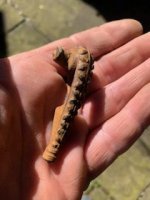A
Ardengard
Guest
Hello,
I am detectorist form Poland and I'm going to spend my vacation in Toscana. Unfortunately I am completely not aware of the Italian law regarding the metal detecting in Toscana (in my case coins). I would grately appreciate your help in claryfiying this issue. Is it possible to search in the fiield in Toscana? Do I have to report it to appropiate authorities? I have tried to find something in the net but I have failed. Please help.
Best Regards,
Ardengard
I am detectorist form Poland and I'm going to spend my vacation in Toscana. Unfortunately I am completely not aware of the Italian law regarding the metal detecting in Toscana (in my case coins). I would grately appreciate your help in claryfiying this issue. Is it possible to search in the fiield in Toscana? Do I have to report it to appropiate authorities? I have tried to find something in the net but I have failed. Please help.
Best Regards,
Ardengard
Upvote
0






